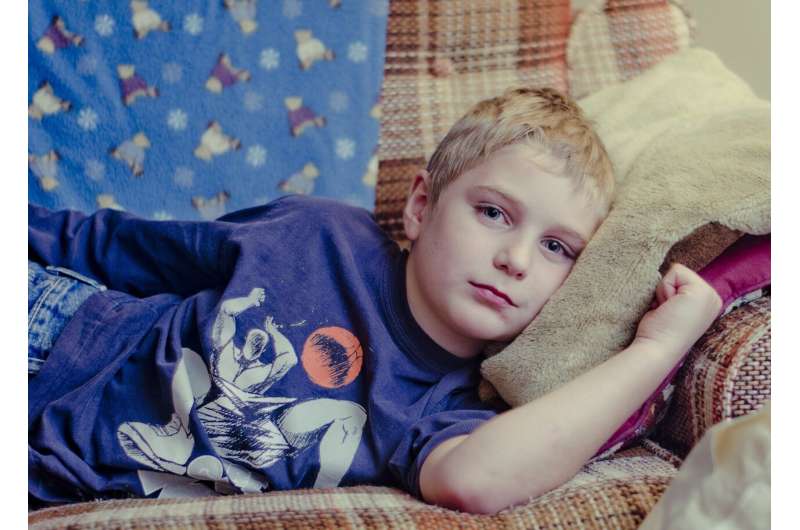This article has been reviewed according to Science X's editorial process and policies. Editors have highlighted the following attributes while ensuring the content's credibility:
fact-checked
trusted source
proofread
National study reveals recovery hurdles for children following COVID-19 hospitalization

New research is showing just how difficult recovery is for children who are hospitalized due to COVID-19. Trailblazing data from a national multicenter survey shows that up to one-third of children did not fully recover and experienced persistent symptoms from 1 to 2 years after release from the hospital.
The research, published in Frontiers in Pediatrics, found that 30% of parents (23 out of 79) reported that their child had not recovered from COVID-19 and/or multisystem inflammatory syndrome in children (MIS-C), a rare but serious complication that can occur after COVID-19.
Children who had not recovered were more likely to have symptoms that were new or persisted after hospital discharge. The majority (87%) of these children had neurological symptoms, in particular headache (60.9%) and weakness (47.8%).
Dr. Beth Slomine, co-director of the Brain Injury Clinical Research Center at Kennedy Krieger, assistant vice president of psychology, and one of the authors in this study emphasizes that these numbers are evidence of the lasting impacts COVID-19 has on some children.
"The numbers are striking and speak volumes," Dr. Slomine said. "Our findings highlight the urgent need for better monitoring systems and care strategies to address the long-term effects that the pandemic made on pediatric health."
Other key discoveries include:
- Of children in the not recovered group, 40% had at least one return emergency visit, and 24% were readmitted to hospital.
- Children in the not recovered group had increased signs of inflammation at hospital admission, compared to those who had not recovered.
- Children considered recovered by their parents had fewer symptoms and better health-related quality of life than those reported as not recovered.
![The median age was 6.5 [interquartile range (IQR) 2.0, 13.0] years and 38.0% were female (Table 1). Of the 51 (64.6%) children with a pre-existing condition, 24 (30.4%) had neurologic conditions. Most (75.5%) children had acute SARS-CoV-2 and 36.7% were admitted to the intensive care unit (Supplementary Table S1). Fewer Hispanic patients were represented in Tier 2 (12.1%) than in Tier 1 (31.1%) and slightly fewer patients in Tier 2 were admitted to the ICU (36.7%) compared with Tier 1 (45.8%). Fewer children had impairment at hospital discharge in Tier 2 (9.1%) vs. Tier 1 (17.0%). Credit: Frontiers in Pediatrics (2024). DOI: 10.3389/fped.2024.1340385 National study reveals recovery hurdles for children following COVID-19 hospitalization](https://scx1.b-cdn.net/csz/news/800a/2024/national-study-reveals.jpg)
According to the multicenter survey data, the children who were not recovered also faced heightened pandemic-related social stress.
"In the survey, some families reported changes in routines, difficulties accessing mental health treatment, and changes in food access," Dr. Slomine said. "More research is needed to understand better the relationship between pandemic-related social stress and prolonged symptoms."
Twelve U.S. medical sites participated in this study. The research is part of the Global Consortium Study of Neurologic Dysfunction in COVID-19. This worldwide research partnership kicked off in April 2020 to explore how often neurological problems occur for patients once they are released from a hospital.
Dr. Ericka Fink, professor of Critical Care Medicine at the University of Pittsburgh critical care pediatrician and UPMC Children's Hospital of Pittsburgh, and lead author of the study, says the next step is to delve deeper into understanding inflammation markers and other factors that could potentially help predict which patients are at risk for ongoing symptoms.
"Our findings are an important step towards understanding why some children do not fully recover from COVID-19," Dr. Fink said. "In the future, we may be able to develop a simple screening test to identify which children are at risk and may need longitudinal, multidisciplinary care or offer specific interventions to accelerate recovery."
Many of the centers involved in the study have efforts underway to educate the public about the risks of COVID-19. At Kennedy Krieger, there is a specific focus on addressing the repercussions of pediatric long COVID-19.
Most children diagnosed with COVID-19 and long COVID experience mild acute infections that don't warrant hospitalization, and their deficits tend to be more subtle. Dr. Slomine emphasizes the importance of empowering families with knowledge about the risks associated with COVID-19, enabling them to make informed decisions and be prepared for potential challenges.
"As we continue to learn about COVID-19, education and awareness remain at the forefront at Kennedy Krieger and around the world," Dr. Slomine said. "Collaborative endeavors such as these are pivotal in guiding our research and ensuring the best care possible for children affected by the virus."
More information: Ericka L. Fink et al, Post-discharge outcomes of hospitalized children diagnosed with acute SARS-CoV-2 or MIS-C, Frontiers in Pediatrics (2024). DOI: 10.3389/fped.2024.1340385


















